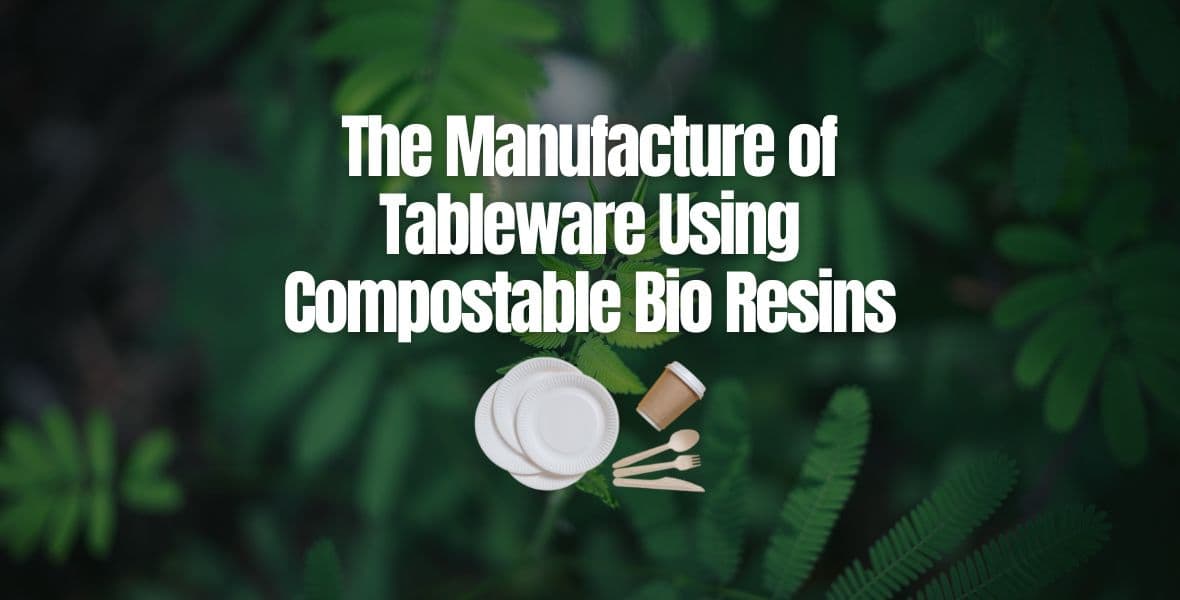With the growing concern about the use of non-biodegradable plastics and the increasing demand for sustainable products, there has been a significant increase in research about recycling materials using synthetic resins that mimic nature. These bio resin products are made from plant biomass such as corn, wood pulp or even paper with natural additives such as waxes to increase durability and water retention properties.
Bio-resins are manufactured by combining a variety of ingredients including plasticizers, waxes, oils and enzymes used to break down plant materials into simpler elements. In this article you will learn about the manufacture of tableware using compostable bio resins, advantages and disadvantages of these products, and which types of manufacturing facilities are available to process your compostable items.
What is Compostable Resin Tableware?
The manufacturing of bio resin products allows for the use of renewable raw materials, reduces carbon dioxide emissions, and reduces landfill waste because these products biodegrade in just a few months. Due to the lack of chemical additives, bio resin products are generally more stable to sunlight, oxygen, and moisture which can cause issues for plastics with additives that can become brittle or soft under these conditions. Bio resin manufacturing starts with a bio-composite or bio-resin material made from plant materials such as corn cassava, or wood pulp. The bio composite is then mixed with additives to create a formulation that creates a hydrophobic surface. This formulation can then be extruded and molded to create shapes and then cured to create a durable product. The most common tableware manufactured at Homelink using bio resins such as PLA and PHA are plates, bowls, cups, straws, and food storage containers.
Advantages
- Reduced carbon footprint – The production of bio resin products uses renewable raw materials and generates less carbon dioxide emissions than regular plastic manufacturing.
- Reduced landfill waste – Bio resin products biodegrade in a short period of time which can reduce landfill waste.
- Reduced water consumption – The manufacturing of bio resin products does not require the use of water or chemicals that are typically used in the production of plastic. The use of bio resins eliminates the dependency on fossil fuel resins.
Disadvantages
- Lower durability – A major advantage of bio resin products is their low carbon footprint and low landfill waste but they do have a lower durability compared to other tableware materials. Since bio resin products degrade over time, they lose their strength and can crack when dropped.
- Expensive – Bio resin manufacturing is more expensive than other tableware manufacturing methods because of the energy usage and formulation mixtures.
Conclusion
Bio resin products are becoming more prevalent in the market and for good reason! These sustainable products are made from plant-based materials that are sustainable, biodegradable, and, if composted properly, do not produce landfill waste. These products are eco-friendly, cost-efficient, and sustainable; what’s not to love? Due to the lack of chemical additives and polymers, bio resin products are generally more stable to sunlight, oxygen, and moisture which can cause issues for plastics with additives that can become brittle or soft under these conditions.
Overall, bio resin products are a great alternative to plastic tableware, especially if you are looking to reduce your carbon footprint. Bio resin products are manufactured using renewable materials such as corn, cassava and wood pulp. The bio composite is then mixed with additives to create a formulation that creates a hydrophobic surface.
This formulation can then be extruded to create shapes and then cured to create a durable product. The most common tableware manufactured at Homelink are food storage containers made PLA and PHA. Bio resin products are becoming more prevalent in the market and for good reason!
Our Company
Homelink is a world leader in the manufacture of tableware using compostable bio resins. Homelink began studying more sustainable sources of resins in 2010. In 2012 we purchased equipment to begin producing more than 5,000 MT of biodegradable material. Today that number has increased to 100,000 MT making Homelink the largest compounder and fabricator in the world. PLA is a thermoplastic monomer derived from renewable, organic sources such as sugar. All of Homelink’s PLA offerings are 100% certified compostable in municipal composting facilities.
PHA is an eco-friendly alternative to petrochemical plastics and effectively biodegrades in aerobic or anaerobic environments, such as a landfill, waste treatment facility or the ocean.

